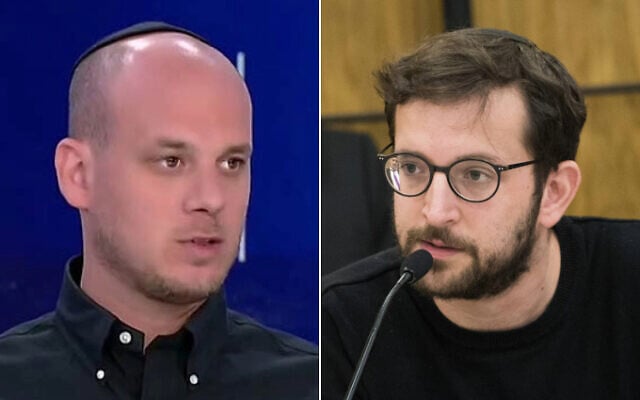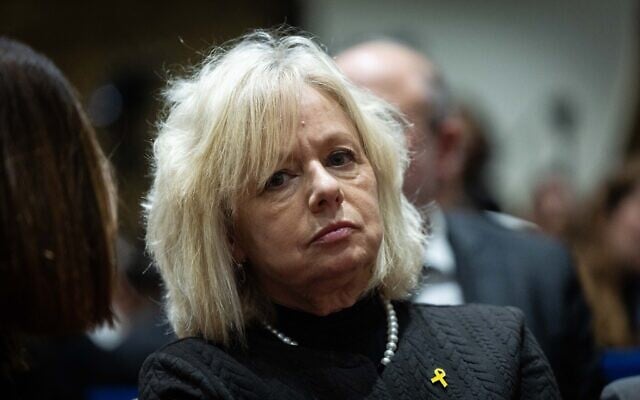



Prime Minister Benjamin Netanyahu’s cabinet voted unanimously in the early hours of Friday morning to dismiss Shin Bet chief Ronen Bar, the premier’s office announced.
Bar’s final day will be April 10, with the government moving up his dismissal after initially scheduling it for April 20, though Netanyahu’s office said Bar could be gone before then if ministers approve a permanent replacement.
The move marked the first time in Israeli history that the government has fired the head of the domestic security agency.
Netanyahu told the cabinet in a meeting that started late Thursday night that he lost faith in Bar after the October 7, 2023, Hamas assault on southern Israel.
Bar is “soft” and “not the right person to rehabilitate the organization,” Netanyahu said, according to his office.
“I have been managing diplomatic negotiations for many years,” continued Netanyahu. “He had a soft approach and not aggressive enough.”
He claimed that since replacing Bar on the negotiating team with another senior Shin Bet official, “the leaks have decreased dramatically, and through very successful negotiations we have managed to return the hostages.”
The ceasefire and hostage deal with Hamas was signed in January, weeks before Netanyahu removed Bar from the negotiating team, which has not secured the release of any additional hostages since then.

As ministers deliberated, the Shin Bet circulated a letter Bar sent to the cabinet explaining why he wouldn’t attend the meeting. He blasted the government’s “unfounded claims that are nothing more than a cover for completely different, extraneous and fundamentally invalid motives designed to disrupt the ability of the Shin Bet to fulfill its role.”
He warned that Netanyahu was taking steps that weaken the country “both internally and against its enemies.”
Saying that he and Netanyahu worked effectively to bring about January’s hostage release deal with Hamas and a series of operational successes on Israel’s southern and northern war fronts, Bar said there wass no basis for the premier’s insistence that there is no trust between them, “except if the real intention, which I apparently failed to understand, was to negotiate without reaching a deal.”
He added that Netanyahu’s decision to remove him and Mossad chief David Barnea from the hostage negotiations “harmed the team and did not advance the release at all.”
Turning to “Qatargate” – what Bar calls the “ongoing complex, extensive, and highly sensitive investigation currently underway into Qatar’s involvement in the heart of Israeli decision-making, the Prime Minister’s Office” — the Shin Bet chief says that completing the investigation in full is “a public duty of the highest order.”
Dismissing the Shin Bet head during the investigation, Bar argued, was tainted with “extraneous considerations and a personal and institutional conflict of interest that could not be more serious.” It risks jeopardizing the investigation, he said, which is a danger to the country’s security.
He also pushed for a state commission of inquiry into October 7: “The urgent national need for such an investigation cannot be subordinated to the personal considerations of those involved in the matter, as it is the only way to ensure that such a multi-system failure will not occur again.”
Bar said the government meeting tonight was convened in contradiction of Israel’s laws and against the attorney general’s position.
“My decision not to attend the government meeting stems solely from my understanding that this is a discussion that is not in accordance with the provisions of the law and the rules concerning the termination of the term of office of any employee, let alone one holding a senior position, and the position of head of the Shin Bet in particular,” he explained.
“A substantive response to such claims requires an orderly process, including the presentation of relevant documents, and not a seemingly premeditated process whose outcome is predetermined,” said Bar.
Responding to Bar’s letter, an “Israeli official” accused the spy chief of nothing less than doing nothing to stop the Hamas October 7 attacks even though he allegedly knew it was going to happen beforehand.
“Ronen Bar preferred not to attend the government meeting dealing with his case, simply because he was afraid of giving answers,” said the official, whom Channel 12 identified as Prime Minister Benjamin Netanyahu himself, “and especially of answering one question — Why, after you knew about the Hamas attack many hours before it happened, did you do nothing and did not call the Prime Minister – something that would have prevented the disaster?”
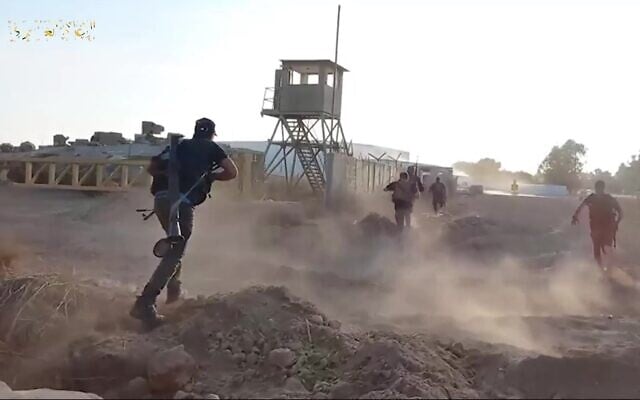
Netanyahu has sought to shift the responsibility for the colossal failure onto the shoulders of the security establishment, arguing he was not woken up when signs of impending attack were being picked up by Israel’s intelligence services while denying he bought into the “conception” that Hamas was more interested in governing Gaza than attacking Israel despite for years having placated the terror group with Qatari funds, work permits and limited responses to attacks.
Fifty-one percent of Israelis oppose the firing of Bar, compared to 32% who back his dismissal, a Channel 12 opinion poll found.
Forty-six percent say they trust Bar more than they trust Netanyahu, while 32% trust Netanyahu more than Bar.
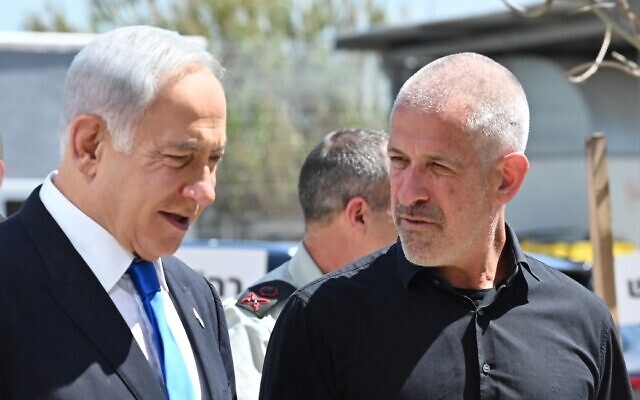
“The main reason why I will vote in favor of removing the head of the Shin Bet from his position is his responsibility for the October 7th failure, a responsibility that he explicitly acknowledged,” said Foreign Minister Gideon Sa’ar. He noted that many other senior defense and security officials have stepped down over the calamity, the worst attack in Israel’s history and deadliest day for Jews since the Holocaust, which Netanyahu and members of his government have refused to similarly resign over for failing to prevent.
Agriculture Minister Avi Dichter of Likud, a former head of the Shin Bet, explained his vote to dismiss Bar by pointing to the importance of trust between the prime minister and the spymaster.
“Unlike an institution that has operational aspects, the Shin Bet also has personal aspects related to the prime minister,” said Dichter, “the Shin Bet chief is responsible for the prime minister’s personal security.”
“In a situation of lack of confidence, there are two options: either the Shin Bet chief resigns, or he is fired. And if he does not resign, then he is fired.”
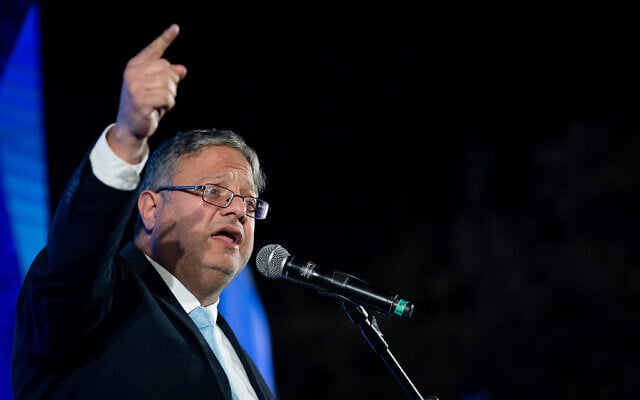
National Security Minister Itamar Ben Gvir, meanwhile, claimed Bar is a “direct threat to democracy,” according to Hebrew-language media reports. Ben Gvir, who has previously been found convicted of incitement and supporting a terrorist organization, has long railed at Bar for warning about settler violence in the West Bank and the far-right minister’s actions on the flashpoint Temple Mount in Jerusalem’s Old City.
Opposition figures panned the cabinet as ministers deliberated. National Unity leader Benny Gantz said the decision to fire Bar was a “mark of Cain” on all ministers who vote in favor.
“The dismissal of the Shin Bet chief for political reasons is a mark of Cain on every government minister who raised his hand tonight, and will be remembered with eternal shame.”
The Democrats leader Yair Golan said that Bar’s letter to the cabinet was “an unprecedented indictment.”
Yisrael Beytenu party leader Avigdor Liberman tore into the government for voting to fire Bar “amid a war against all our enemies.”
“The prime minister of October 7 [Benjamin Netanyahu] is doing exactly what our enemies dream of — fighting the Shin Bet head,” Liberman said. “[Netanyahu] needed to take responsibility after the disaster, resign first and demand all those to blame for the failure join him.”
Opposition Leader Yair Lapid said the government was dismissing Bar “for one reason alone: To stop the Qatargate investigation.”
“Opposition parties will together appeal this reckless step that is meant to whitewash a hostile state’s penetration into the prime minister’s office,” Lapid charged.
Attorney General Gali Baharav-Miara, who was present for the vote and opposed the decision, previously warned Netanyahu that he could not fire Bar before her office reviewed his motives for doing so, amid the Shin Bet investigation into the premier’s aides and their alleged ties to Qatar.
The move to fire Bar, announced by Netanyahu on Sunday, sparked mass protests across the country, with critics fearing that the prime minister is seeking to replace Bar with a loyalist who will quash the Shin Bet’s ongoing Qatar probe, as well as further solidify and potentially politicize the government’s hold over the country’s security apparatuses.
Thousands of people protested on Thursday night in front of Netanyahu’s office as the cabinet met.
Appearing as a sea of umbrellas in the driving rain, the demonstrators marched from Netanyahu’s residence to the nearby office while chanting, “We will never give up,” capping off a day of protests that saw clashes with police who in some cases used water cannons on protesters.
Some demonstrators protested by blocking the entrance to the Prime Minister’s Office with their cars ahead of the cabinet meeting. Footage showed policemen smashing the windows of the cars while passengers were inside to remove them.
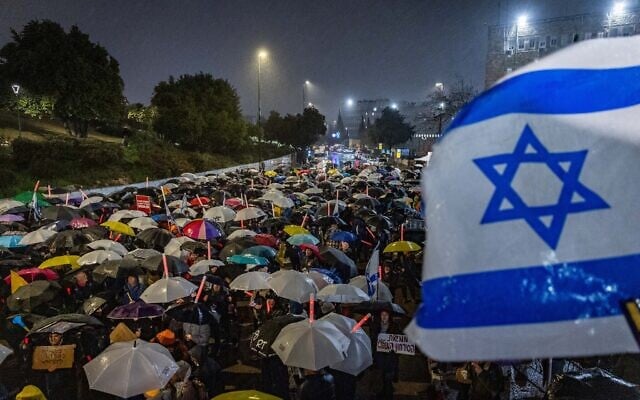
Netanyahu has insisted the investigation into the hundreds of thousands of dollars that his aides allegedly received from Qatar, which the attorney general ordered be opened last month, was politically motivated. Before the vote to fire Bar was scheduled, police on Wednesday evening detained and questioned two suspects in the case, who have not been named.
Baharav-Miara, who the government is also moving to oust — with reports suggesting a vote to dismiss her could be held as early as Sunday, had said the premier cannot fire Bar unless he consults her and establishes a “factual and legal basis” for doing so. Netanyahu responded by accusing Baharav-Miara of “abusing her authority.”
After Netanyahu’s office announced Thursday’s night vote, the government pushed off a previously scheduled cabinet meeting on the resumption of the Gaza war until next week.
Although Bar has expressed his intention to eventually resign over his agency’s failure to anticipate the October 7, 2023, Hamas-led attack, he had been pushing back against the prime minister’s efforts to oust him, fearing that acquiescence would allow Netanyahu to appoint a loyalist in his stead.
The Shin Bet head was reportedly planning to remain in his post until all the hostages were returned from Gaza and a state commission of inquiry was established to probe the failures surrounding October 7.
According to a Channel 12 news report Wednesday, the leading candidates to replace Bar are the Shin Bet’s recently departed deputy chief, known only by his first initial “Mem,” and “Resh,” who was previously considered for the post. The network reported that former senior Shin Bet official Shalom Ben Hanan was also under consideration.

